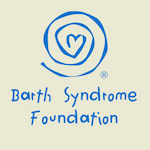Barth Syndrome Awareness Day Date in the current year: April 5, 2026
 Barth Syndrome Awareness Day is observed annually on April 5. It was created to spread information about an ultra-rare but very serious and potentially life-threatening disorder that can affect multiple body systems and primarily affects males.
Barth Syndrome Awareness Day is observed annually on April 5. It was created to spread information about an ultra-rare but very serious and potentially life-threatening disorder that can affect multiple body systems and primarily affects males.Barth syndrome (BTHS) is caused by a mutation in the TAFAZZIN gene (also called TAZ or G4.5), which encodes a protein found in heart and skeletal muscle that is involved in lipid metabolism. It is named after Dr. Peter Barth from the Netherlands who published the first comprehensive description of the syndrome in the early 1980s.
BTHS is an X-linked recessive disorder, which means that it primarily affects males, while females can be asymptomatic carriers of the mutated gene. This is because females with a mutated X chromosome have a second X chromosome with a normal TAZ gene, while males have only one X chromosome, so there is no “backup” for the mutated gene.
Barth syndrome primarily affects the cardiovascular, musculoskeletal, nervous, and metabolic systems, with symptoms varying in severity from case to case. The most common symptom of the syndrome is dilated cardiomyopathy (an enlarged and weakened heart).
Other symptoms include other forms of cardiomyopathy, arrhythmias, feeding problems, muscle weakness, low muscle mass, exercise intolerance and extreme fatigue, delayed motor development, metabolic disorders, delayed growth and puberty, and frequent infections caused by neutropenia (abnormally low levels of one of the white blood cell types).
The incidence of Barth syndrome is estimated to be one in 300,000 to 400,000 births. However, the syndrome is believed to be severely underdiagnosed for several reasons. First, it’s very rare and has a relatively high frequency of new mutations. Second, not all patients present with all symptoms at the same time. Third, in the past, children with the syndrome often died by the age of three from infections or heart failure. Worldwide, fewer than 300 people have been diagnosed with BTHS.
There is currently no specific cure or even treatment for Barth syndrome, but research is ongoing (as of 2025, elametride is in clinical development for Barth syndrome and other conditions associated with mitochondrial dysfunction, but it has not been approved by the FDA). Various symptoms (cardiovascular problems, nutritional problems, infections, etc.) are treated as they occur, and ongoing monitoring for potential problems is recommended for patients with BTHS.
Barth Syndrome Awareness Day was created to bring together people affected by this rare disease, their families, medical professionals and other stakeholders to spread information about Barth syndrome and advocate for research and better access to diagnosis and treatment. It is celebrated on April 5 (4/5 in the American date format) because the syndrome is caused by a mutation in the G4.5 gene. If you’d like to get involved, you can learn more about the syndrome and share what you’ve learned with others, donate to the Barth Syndrome Foundation, and spread the word using the hashtag #BarthSyndromeAwareness.
- Category
- International Observances
- Tags
- Barth Syndrome Awareness Day, international observances, rare diseases, genetic disorders, awareness days